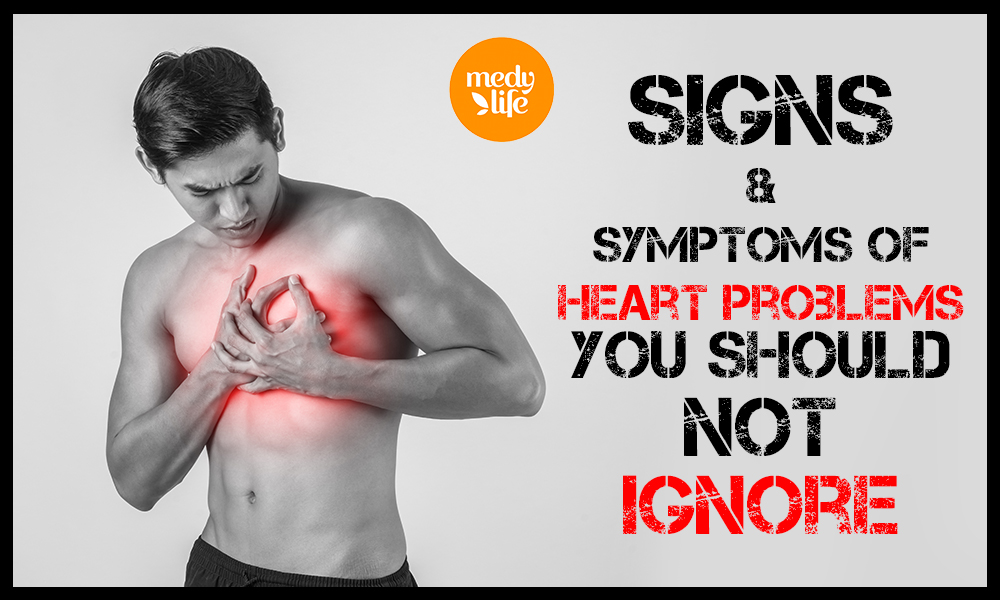
Signs and Symptoms of Heart Problems You Should Not Ignore
14-05-2018 | Posted By: Chhavi | 8491 View(s)
Heart disease is a medical term that covers every disorder of the heart. Heart disease is the leading cause of death in the United States, Canada, Australia and the United Kingdom. There are many kinds of heart disease such as congenital heart disease, coronary heart disease, arrhythmia, myocardial infection, mitral valve prolapse, and so on. It is not important that all heart problems come with clear warning signs. There are many heart symptoms that do not even happen in your chest. It is important to watch for signs and symptoms of heart problems to keep heart disease at bay. Here we are going to share with you the signs and symptoms of heart problems you should not ignore.

Top Symptoms of Heart Problems You Should Never Ignore
1. Throat or Jaw Pain
Throat or jaw pain is not really heart-related always. Throat or jaw pain is mostly caused by a cold, muscular issue, or a sinus problem. However, if you experience pain or pressure in your chest that spreads up into your throat or jaw, it could be a warning sign of a heart attack. If you or anyone else experience such pain, seek medical attention immediately.
2. Chest Discomfort
Chest discomfort is a common sign of heart disease. Everyone experiences a different kind of chest discomfort. For some, it is like pinching or burning, while for others its like heaviness in their chest. Pain in the chest usually lasts longer than a couple of minutes. A person may experience chest discomfort when he/she is at rest or when he/she is doing something physical. According to doctors, if the pain is for a brief period of time or if it is a spot that hurts a lot when you touch it, then it’s probably not heart disease. However, you should still consult a doctor if you experience chest pain. If the symptoms are more severe and chest pain doesn’t go away after a few minutes, call an ambulance immediately.
3. Nausea
Some people experience symptoms such as nausea, heartburn, stomach pain, or indigestion during a heart attack. Many people ignore these symptoms because they think these are just related to stomach problems. However, if the symptoms persist, you must consult a doctor.
4. Pain in the Arm and Left Side of the Body
One of the major symptoms of heart disease is pain that spreads to the arm. The pain linked to heart disease starts from the chest and moves outward. Mostly, people experience pain in the arm when they have a heart attack.

5. Dizziness or Lightheadedness
It is normal to feel dizzy or lightheaded when you didn’t have proper breakfast or lunch. Many people lose their balance when they stand up too fast, which is perfectly normal. However, if you suddenly feel lightheaded and also experience shortness of breath or chest discomfort, consult a doctor immediately.
6. Fatigue
We all feel tired after coming back from office or college. However, if you suddenly feel fatigued or exhausted after doing something you did without feeling tired in the past- like climbing the stairs, schedule an appointment with a doctor right away.
7. Snoring
It is perfectly normal to snore a little while you sleep. But if the snoring starts sounding like a gasping or choking- it can be a sign of sleep apnea. In this condition, a person stops breathing for brief moments several times at night. This condition puts extra pressure on the heart.

8. A Persistent Cough
In the majority of cases, a cough is not a sign of heart disease. However, if you have a cough that just won’t quit, you must consult your doctor.
9. Irregular Heart Beat
Does your heart beat faster when you are excited or nervous? Well, it’s quite normal! But, if you have an irregular heartbeat out of a sudden, call a doctor right away.
Do not ignore these signs and symptoms of heart problems. If you experience any of these symptoms, consult a cardiologist right away.


